Among the most iconic institutions gifted to Bombay, the Time & Talents Club stays robust and relevant. Its firm humanitarian resolve engages with philanthropy and entertainment in wonderfully equal measure
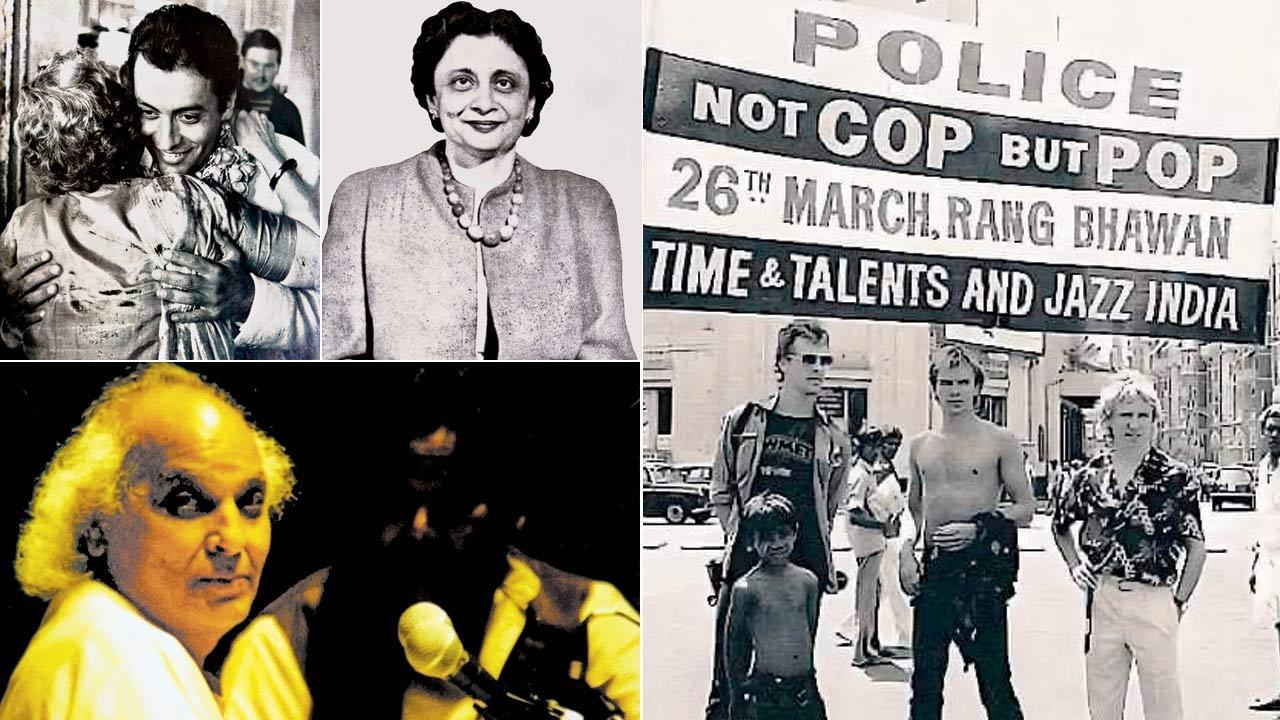
(Clockwise from top left) A young Zubin Mehta embracing the Club founder-president Gool Shavaksha, also seen alongside; Stewart Copeland, Sting and Andy Summers in March 1980, for their show billed as Bombay’s first foreign rock gig. For those misled by posters stating “The Police are coming” with a blue-uniformed city havaldar, this banner clarified it was the rock band in town; Pandit Jasraj, one of several Indian classical musicians whose shows have been hosted. Pics Courtesy Time & Talents Club and Charmaine Dhondy
 Eat from here so others eat too,” she said. That was my grandmother, who would buy copies of everybody’s favourite cookbook to distribute. Our 1971 volume was happily thumbed enough for a bunch of recipes to be planted pat in my mum’s head.
Eat from here so others eat too,” she said. That was my grandmother, who would buy copies of everybody’s favourite cookbook to distribute. Our 1971 volume was happily thumbed enough for a bunch of recipes to be planted pat in my mum’s head.
ADVERTISEMENT
Indelibly stamped in the Parsi psyche is the comfort of growing up with the ubiquitous Time & Talents Cookbook. Its sales figures are just one popular way the club raises funds for several thousands of worthy beneficiaries. Kickstarting its 90th year celebrations is Dramatic Effect, a song and dance spectacular at the NCPA on September 1.
Founder-president Gool Shavaksha would be gratified to see the lasting legacy of her homespun philanthropy. On a sunny September afternoon of 1934, three enterprising Mulla family women, Gool, Hilla and Sooni, met Roshan Sethna, fresh from a trip to Rajasthan where she learnt to make intricate jewellery. Teaching them the skill, Sethna picked up other crafts from the trio.
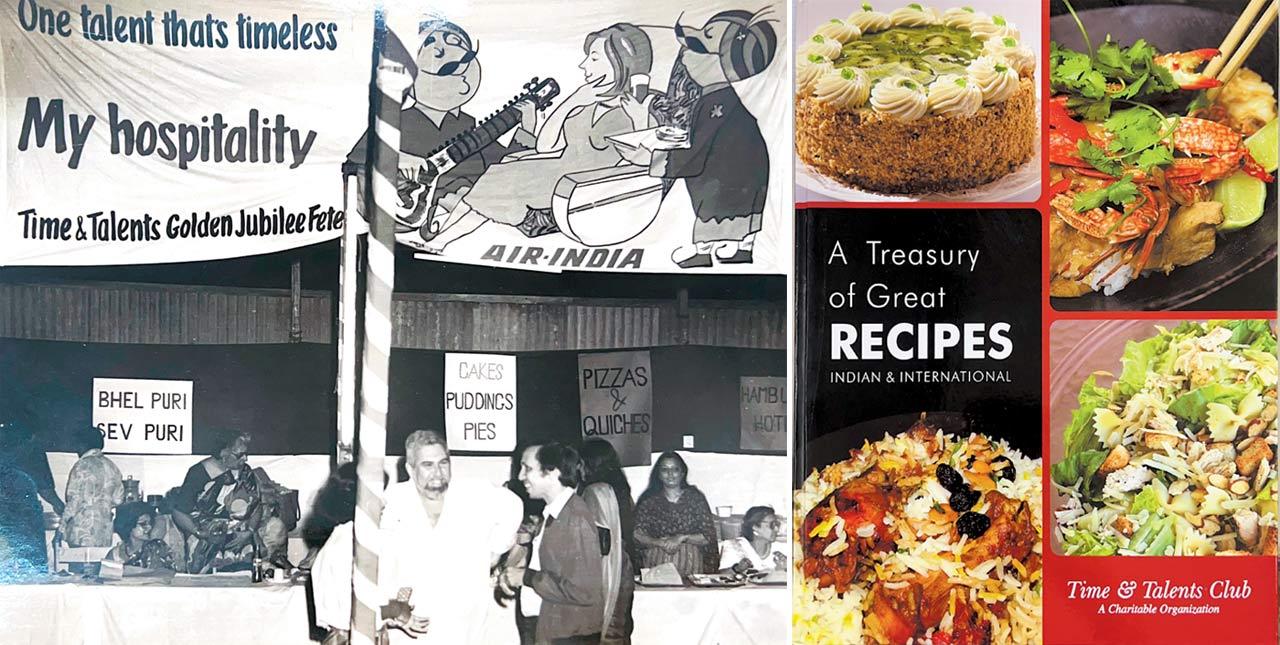 Scene at the golden jubilee fund-raiser fete in 1984; (right) The celebrated recipe book cover
Scene at the golden jubilee fund-raiser fete in 1984; (right) The celebrated recipe book cover
Adding friends, the group met on Wednesdays at the home of Lady Jerbai Mulla, who suggested they sell for charity the items of their combined interests: jewellery, crepe paper pictures, glass painting and, for the first time in the city, Barbola work (using wire and plaster for intricate designs).
They sewed, smocked, knitted and cooked before heading to poetry reading, music appreciation and dramatics. All aimed at utilising their time to develop talents which were monetised for ease to the distressed.
The initiative was named Time & Talents Club by Jerbai’s daughter Gool (Shavaksha), hoping to mirror the good work of The Time & Talents Club in England. Motivating hundreds of like-minded women with an axiom she lived purely by—“To give at once is to give twice”—Shavaksha groomed the dedicated group to disburse funds that extend today to rural reaches of the country and enriched Bombay’s cultural scene. These sterling objectives were realised through three staples: concerts, the Victory Stall and the Recipe Book.
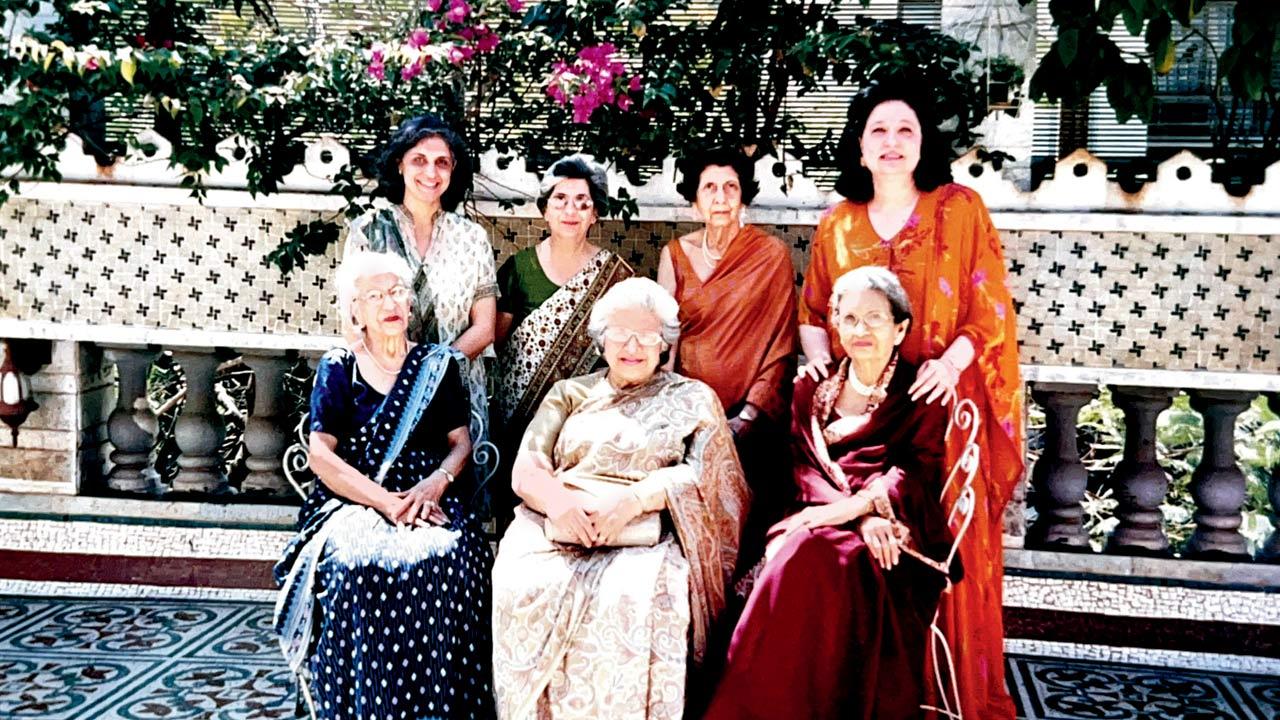 Line-up of some committee members: (standing from left) Delara Jejeebhoy, Pilloo Cooper, Silloo Mistri, Meher Amersey, (seated) Aimai Adenwalla, Eva Khambata and Mithoo Coorlawala
Line-up of some committee members: (standing from left) Delara Jejeebhoy, Pilloo Cooper, Silloo Mistri, Meher Amersey, (seated) Aimai Adenwalla, Eva Khambata and Mithoo Coorlawala
Though never asserting a “Parsis only” stipulation, the club has a predominant number of the community as members. True to type, talent spotting is a high priority. A ballroom dance competition at Green’s Hotel was the forerunner of entries invited for categories like elocution, music, drawing, flower decorating, gymnastics, cycling and jazz band.
The Programme and Fund-raising Committee, the backbone of the club, netted money from outstanding concert events. Lady Jerbai Mody, Mithoo Coorlawala, Dhunbai Masani, Sylla Vatcha, the Begum of Palanpur, Pipsy Wadia and Mehroo Cama, among others, undertook the onerous task of fund collection. Impressed by their sincerity of purpose, members and the general public responded fulsomely.
The first artiste the club presented was violinist Mehli Mehta, Zubin Mehta’s father, in the Monginis Hall at Churchgate. Next came chamber music concerts, for which Hilla Daruvala printed free programmes with the complete score of pieces performed—a first for Bombay.
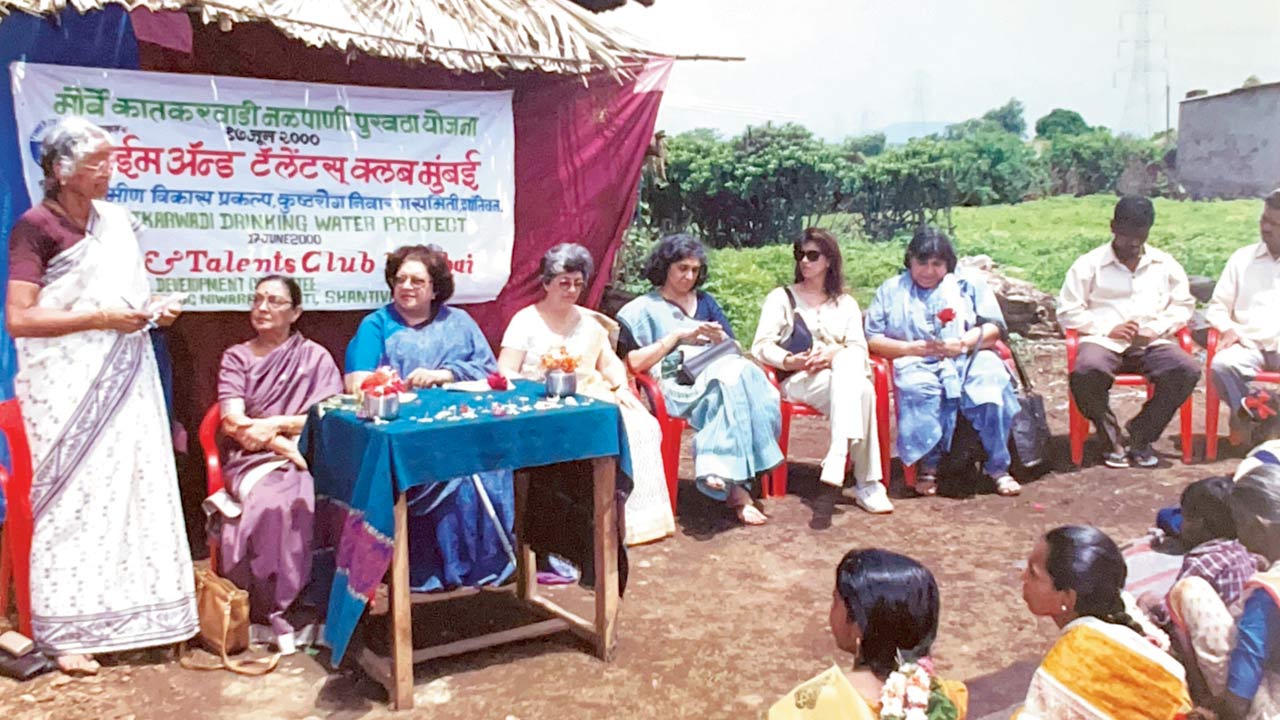 Meeting for the Mahalungi village water project in Raigad
Meeting for the Mahalungi village water project in Raigad
In wartime, members acquainted themselves with bandage-making, first aid and fire-fighting. Running canteens, they rode in trucks to chawls, demonstrating food substitutes in days of rationing. Emerging from grim times, in 1947 a summer ball was organised at Lady Saklatvala’s Breach Candy house by Dinoo Dubash and Lady Duggan. The moonlit night was compered by couturiere Madame Pompadour (Katherine Courtney) who designed the dresses.
For the club’s coming of age, turning 21 in 1955, Adi Marzban wrote a topical satire. In 1959, the silver anniversary year, the first competition encouraging young city musicians chose winners the world would soon be familiar with—composer Vanraj Bhatia, sitarist Pandit Nayan Ghosh and physicist Dr Raja Ramanna.
Along with the Bombay City Orchestra conducted by Vere de Silva, notable 1950s events were the San Francisco Ballet at newly constructed Rang Bhavan, the Minneapolis Symphony Orchestra and four Celebrity Concerts by violin maestro Yehudi Menuhin and pianist Louis Kentner, with the Symphony Orchestra of Bombay. Club old-timer Pilloo Cooper shares a charming episode. Trying to persuade pianist Benno Moiseiwitsch for a repeat recital after his electrifying debut, the club ladies gamely acceded to his request. To play quick rounds of bridge with him.
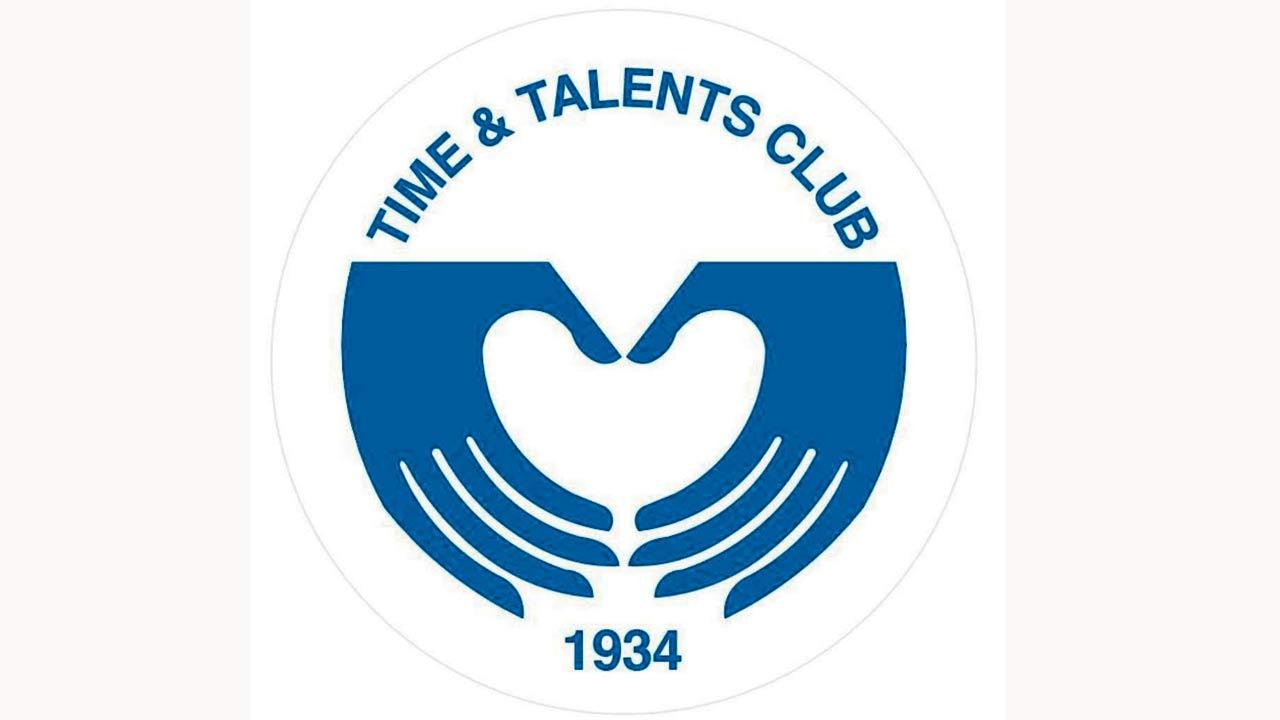 Club logo with a heart and helping hands motif, designed by Walter Saldanha
Club logo with a heart and helping hands motif, designed by Walter Saldanha
In another memorable performance, Zubin Mehta conducted the Los Angeles Philharmonic Orchestra in 1967 at Shanmukhananda auditorium. Between 1962 and 1969, glamorous haute couture representatives from Christian Dior, Pierre Cardin and Jacques Esterel were flown in for fashion extravaganzas. Importantly, 1963 saw the inception of the Victory Stall and the legendary Recipe Book. More on both icons in a bit.
From 1983, corporate sponsorship from Vazir Sultan Tobacco Co (VST), fully covered concerts, also addressing costs of design and printing brochures. A beautiful example was the golden jubilee souvenir on the occasion of Zubin Mehta wielding the baton for New York Philharmonic Orchestra performances in 1984. Waiving professional fees, the musicians pronounced these the highlight of their entire South Asia tour. With masterly logistics, the Reception Committee, Box Office Committee and Publicity Committee toiled round the clock. For the first time in 50 years, a single event raked in R20 lakh—considerable 40 years ago.
It was joked the Reception Committee functioned as “babysitters”, warmly putting up musicians in members’ homes, taking them shopping and dining, keeping them entertained, and arranging for conveniences like laundry and hairstyling appointments. When Sting arrived with The Police entourage, manager Miles Copeland and drummer Stewart Copeland relished a thali lunch in Meher Amersey’s home. “And the folks sang ‘YO!’ just like in Milwaukee,” marvelled Stewart Copeland remembering the 1980 gig. The gracious hospitality extended by Nergis Erani, Khorshed Bilimoria, Jean Moos, Hilda Khatau and Pheroza Godrej, among others, was matchless. The European Community Youth Orchestra’s secretary declared, “Bombay is magnificent because of you all.”
Navaz Dastur recollects her mother Eva Khambata, former club president, hosting overseas artistes. From associating with the organisation as a five-year-old garlanding performers, Dastur now heads the Medical, Educational and Social Relief Committee. “Our focus is ‘curative cancer’ in children of poor labourers, rickshaw drivers and shopkeepers, requiring chemotherapy, radiation and bone marrow. Progress updates from hospitals are usually heartwarming, a few tragically not.”
Working to heal patients with burn injuries, hearing loss, critical illnesses, accident victims, those awaiting organ transplants and dialysis, the committee held a crowdfunder to encouraging result. Underprivileged and visually impaired students wishing to pursue education in medicine, pharmacy, law, engineering and IT are grateful recipients as well.
Like many, Dastur’s association with the club stays multi-generational. “On Saturday mornings, I went to the club office at Victory Stall, munching on chicken sandwiches while my mother went inside to do what she had to.”
Inaugurated in 1963 by Vijayalakshmi Pandit, then Governor of Bombay, the Victory Stall at Apollo Bunder owed its space to Dr Homi Bhabha’s allotment of a corner of the Atomic Energy Commission complex. Managed by Aimai Adenwalla and Mary Jamsetjee, later driven by Villie Mehta, the landmark outlet served affordable homemade snacks. Proceeds went towards rehabilitating widows and orphans of jawans fighting China in 1962. During the Indo-Pak 1965 and 1971 conflicts, packed gift boxes were sent to soldiers at the front. A fair price shop, The House of Bamboo, was set up on the cafeteria premises. Courting couples to tired workmen to office executives gathered to sup at the stall.
Other fund-raisers lighting up the city were the 1986 premiere of the film, On Wings of Fire, and Zubin Mehta revisiting, the year after, with the Florence Festival Orchestra shows. VST’s continuing sponsorship seeded the “Spirit of Freedom” series of concerts from 1988. Under the guidance of Ratti Mehta, Mehroo Jeejeebhoy, Aloo Kapadia and Tehmie Gazdar, the Music & Arts Committee kept dazzling appreciative audiences with international greats. Unsurprisingly, the Christian Science Monitor dubbed the club “the city’s leading concert agency”.
Significant Indian classical artistes staging successful shows thanks to Time & Talents patronage have been sitar stars Pandit Ravi Shankar, Ustad Vilayat Khan and Pandit Niladri Kumar, and vocalists Pandit Bhimsen Joshi, Pandit Jasraj and Pankaj Udhas.
To return to the 12-edition cult cookbook. The genesis of this tome, titled The Time & Talents Club Recipe Book, dates to the Second World War. Responding to pervading hardships, clubbers consciously stirred up “anti-waste” meals, compiling recipes from single sheets to leaflets. Printed in book form in 1963, crisp instructions for thrifty treats like Gool Shavaksha’s stuffed cold tomatoes, Sehra Albless’ brinjal skin saakh and Gladys Kothavala’s watermelon peel pickle, occupied a special section.
The Recipe Book Committee’s efforts reflected a cosmopolitan potpourri of influences, from Bhicoo Manekshaw’s pesche ripiene and Kamla Dutt’s patoori fish, to Khatta Tyabji’s mutton biryani and Margaret Griffin’s chow mein. Niloufer Ichaporia King, author of My Bombay Kitchen: Traditional and Modern Parsi Home Cooking, describes the gastronomic gleanings from around the globe as a “perfect window into Bombay’s changing, food-of-everywhere culinary culture”.
Our family table tasted everything, from humble Gujarati tittori dal and the ghee-on-griddle pancake called chaapat, to pukka Brit oven-hot Toad-in-the-Hole. The page facing the recipe for this sausage bake was underlined (pages were trimmed by italicised food-related phrases and amusing aphorisms, ranging from Shakespeare and Voltaire to the trippy eccentric) with: “Dis moi ce que tu manges, je te dirai qui tu est—Tell me what you eat, I will tell you who you are.” Subsequent editions deleted regressive thoughts like “A woman who can’t make soup should not be allowed to marry”—quoting writer P Morton Shand, Camilla Parker Bowles’ great-grandfather who married four times.
The recipe bible, which even RK Laxman lauded in a delightful cartoon, remains hearteningly timeless. A bumper edition conceived for this special anniversary promises spanning much more than regular recipes, ingredients and kitchen tips.
Acting president and treasurer Bakhtawar Shroff, whose mother-in-law Mitha Shroff supported the club and sister-in-law Pheroza Godrej is a long-time member, says, “The challenge is of being labelled ‘the Cookbook Club’ or ‘High Society Ladies Club’. Scratch the surface, see what we really do.”
Helming the Projects division, Kamal Mulla says, “Not so posh is knowing the nitty-gritty realities of life our rural interventions tackle. The Kherwadi Social Welfare Association gives us viable projects acknowledging basic needs of villagers in Raigad, Gadchiroli and Palghar.”
To parts of these districts lacking water, Time & Talents provides pipelines and filters for potability, ensuring supply for crops and clean drinking water that prevents disease spread. In Gadchiroli’s backward fringes, menstruating women inhabit ramshackle huts at far ends of villages, without ventilation, water or security. Safehouses built for them are equipped with solar-powered electricity, beds and sewing machines.
Palghar villagers with one-guntha land patches receive infrastructure to grow vegetables for self-consumption and surplus stock sale for income generation. The system of backyard poultry similarly ensures eggs obtained are consumed and the rest sold in local mandis, guaranteeing nutrition and alternate income sources. Youth here availing of certified vocational training courses in computers, beautician care, nursing, plumbing, welding and hospitality, gain alternative employment rather than dread lean monsoon seasons.
“We target specifics like sanitation, toilet blocks and smokeless chulas wherever these are missing,” says Mulla. “A change we’re particularly proud of involves not stopping with the rescue of human trafficked victims, but counselling and getting them jobs.”
Identifying lesser-known NGOs within the city, offered relief donations of grains, rice, sugar, oil and toiletries, Shirin Katgara, who tends to the club’s Welfare activities, says, “When we have funds, I distribute these essentials to places like Sant Gadge Dharamshala for cancer patients, the FS Parukh Dharamshala old age home, Ahura Support for the mentally challenged and Balika Ashram for destitute girls. Occasional contributions are TVs and sanitary towels to a girl’s orphanage. That they access better facilities through more and more donations is so rewarding.”
Bakhtawar Shroff sees infinite possibilities in an environment of sustainability—“Internal sustainability is financial, with a healthy corpus and pyramid-shaped organisation structure. External sustainability has two parts: stat philanthropy fulfilling immediate needs of recipients, and sustainable philanthropy creating long-term ripple effects, pulling them out of a downward spiral or stagnant future. We must look beyond generous member contributions as projects expand. Entering the 90th year, we’re garnering monetary support towards ongoing concerns. I pray the spirit of selfless giving grows by leaps and bounds as we flow from 90 to 100.”
Author-publisher Meher Marfatia writes fortnightly on everything that makes her love Mumbai and adore Bombay. You can reach her at [email protected]/www.meher marfatia.com
Also Read: Celebrating India’s royal kitchens one pop-up at a time
 Subscribe today by clicking the link and stay updated with the latest news!" Click here!
Subscribe today by clicking the link and stay updated with the latest news!" Click here!







